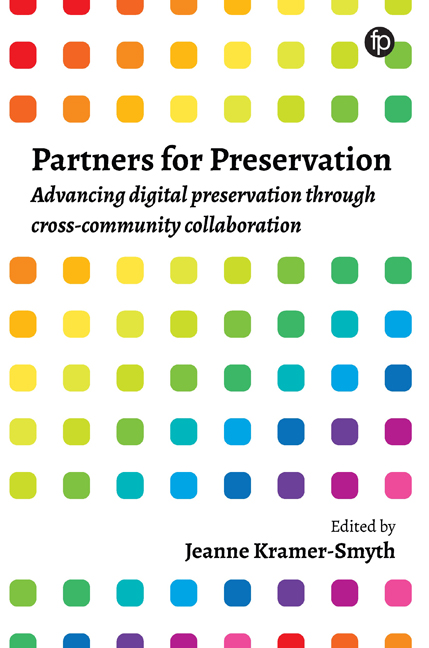Introduction
Published online by Cambridge University Press: 08 June 2019
Summary
We are increasingly immersed in and reliant on the digital world. This reliance creates major digital preservation challenges in the archives professional community – and those challenges have parallels in other professional communities. This book gathers essays from subject matter experts in non-archival professions, addressing a wide array of issues arising from real world efforts.
The only certainty about technology is that it will change. The speed of that change, and the ever increasing diversity of digital formats, tools and platforms, will present stark challenges to the long-term preservation of digital records. Archivists frequently lack the technical expertise, subject matter knowledge, time, person-power and funding to solve the broad set of challenges sure to be faced by the archival profession. Archivists need to recruit partners from across as diverse a set of professions that work within the digital landscape as possible.
The chapters of this book are grouped into three sections. The first explores topics related to memory, privacy and transparency. Part 2 includes chapters on the physical world – internet-capable devices, colour reproduction and architectural information. The final section digs into aspects of data and programming.
You can read this book in a number of ways. You can start at the beginning and read straight through, but each chapter can stand alone and be read in any order. The chapters grouped together have been selected for their related subject matter.
This collection is not a ‘how to’ guide, but rather an exploration of how computers and technology affect our ability to preserve information for the future. Collaboration within professions and dissemination of digital content to audiences rely on the ability of individuals to consume digital products in a predictable manner. Efforts to ensure the smooth workings of these processes are often the same struggles archivists face, but archivists have the added challenge of needing to ensure these processes will work many years in the future.
What do we mean when we say ‘digital preservation’? Is it only conquering the dual challenges of extraction from original systems and then storage of 1s and 0s? No: it goes beyond that to include the even greater issues of ensuring renderability and preserving context. Who created the records? How can someone displaced by time or space be sure they are experiencing the content with all of its significant properties intact?
- Type
- Chapter
- Information
- Partners for PreservationAdvancing Digital Preservation through Cross-Community Collaboration, pp. xxi - xxviiiPublisher: FacetPrint publication year: 2018



